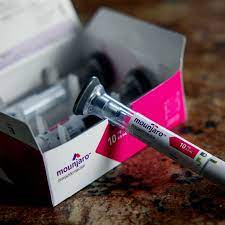Mounjaro: A Subcutaneous Injection for Managing Type 2 Diabetes
Are you looking for an effective treatment option for managing your type 2 diabetes? Look no further than Mounjaro, a brand-name subcutaneous injection that has been specifically designed to help individuals with type 2 diabetes effectively manage their blood sugar levels. With tirzepatide as its active ingredient, Mounjaro, when combined with a healthy diet and regular exercise, can provide relief and improve overall well-being. Available in various strengths, this injection is typically administered just once a week, making it convenient and hassle-free. While Mounjaro may lead to mild digestive problems, injection site reactions, and mild allergic reactions, it's crucial to note that serious side effects such as acute pancreatitis, hypoglycemia, gallbladder disease, and severe digestive problems can also occur. It's essential to consult with your healthcare professional to determine the best course of action. Please remember that Mounjaro is not approved for those with type 1 diabetes or a history of pancreatitis, and while it may facilitate moderate weight loss for some individuals, it is not officially approved as a weight-loss drug.
Mounjaro Overview
What is Mounjaro?
Mounjaro is a brand-name subcutaneous injection used to treat type 2 diabetes. It is specifically designed to help manage blood sugar levels in adults with this condition.
Active Ingredient - Tirzepatide
The active ingredient in Mounjaro is tirzepatide. This ingredient plays a crucial role in regulating blood sugar levels by targeting multiple hormones in the body.
Purpose of Mounjaro
The main purpose of Mounjaro is to help individuals with type 2 diabetes control their blood sugar levels effectively. By doing so, it aids in maintaining stable and healthy glucose levels and reducing the risk of diabetes-related complications.

Dosage and Administration
Mounjaro comes in different strengths and is typically injected once per week. The dosage prescribed by your healthcare provider will depend on various factors, including the severity of your condition and your overall health. It is essential to follow the recommended dosage and administration instructions provided by your doctor for optimal results.
Effectiveness and Benefits
Managing Blood Sugar Levels
Mounjaro is highly effective in managing blood sugar levels in individuals with type 2 diabetes. By targeting multiple hormones involved in glucose regulation, it helps keep your blood sugar within a healthy range. This is crucial for avoiding the long-term complications associated with diabetes.
Complementary to Diet and Exercise
While Mounjaro is effective on its own, it should also be used in conjunction with a healthy diet and regular exercise routine. A well-balanced diet and physical activity play a vital role in managing diabetes, and Mounjaro acts as an additional tool to assist in this process.
Different Strengths Available
Mounjaro offers different strengths to accommodate the various needs of individuals with type 2 diabetes. Your healthcare provider will determine the appropriate strength for you based on your specific condition. It is crucial to communicate any changes or concerns with your doctor to ensure the dosage aligns with your requirements.
Weekly Administration
Mounjaro is typically injected once a week, making it a convenient treatment option for individuals with a busy schedule. By administering the injection at the same time each week, you can establish a routine that becomes a seamless part of your diabetes management plan.

Common Side Effects
Mild Digestive Problems
Some individuals may experience mild digestive problems as a common side effect of Mounjaro. These can include nausea, diarrhea, or upset stomach. While these side effects are usually temporary and mild, it is important to discuss them with your healthcare provider if they persist or worsen.
Injection Site Reactions
Injection site reactions are another common side effect that may occur with the use of Mounjaro. These reactions can include redness, swelling, or discomfort at the site of injection. If you experience any unusual or persistent reactions, it is essential to seek guidance from your healthcare provider.
Mild Allergic Reactions
In rare cases, individuals may experience mild allergic reactions to Mounjaro. These reactions can include skin rash, itching, or hives. If you notice any signs of an allergic reaction, it is crucial to consult with your doctor immediately to determine the best course of action.
Serious Side Effects
Acute Pancreatitis
One of the potential serious side effects of Mounjaro is acute pancreatitis, which is inflammation of the pancreas. Symptoms of pancreatitis can include severe abdominal pain, nausea, and vomiting. If you experience these symptoms, it is imperative to seek medical attention promptly.
Hypoglycemia
Hypoglycemia, also known as low blood sugar, is another serious side effect that can occur with the use of Mounjaro. Symptoms of hypoglycemia can include dizziness, sweating, confusion, and shakiness. It is essential to monitor your blood sugar levels regularly and seek immediate medical attention if you experience these symptoms.
Gallbladder Disease
Mounjaro may increase the risk of developing gallbladder disease in some individuals. Symptoms of gallbladder disease can include abdominal pain, fever, and jaundice. If you experience any of these symptoms, it is crucial to inform your healthcare provider promptly.
Severe Digestive Problems
While mild digestive problems are common, Mounjaro can rarely cause severe digestive problems such as pancreatitis or intestinal obstruction. If you experience persistent or severe abdominal pain, vomiting, or difficulty passing stool, it is crucial to seek medical attention immediately.
Risk of Thyroid Cancer
There is a potential risk of developing thyroid cancer associated with the use of Mounjaro. While this risk is rare, it is important to be aware of the symptoms of thyroid cancer, including a lump or swelling in the neck, difficulty swallowing, or changes in voice. If you notice any of these symptoms, it is vital to consult with your healthcare provider promptly.
Usage Restrictions
Not Approved for Type 1 Diabetes
Mounjaro is specifically designed for individuals with type 2 diabetes and is not approved for use in people with type 1 diabetes. It is crucial to consult with your doctor to determine the most appropriate treatment options if you have type 1 diabetes.
Not Approved for Pancreatitis History
Individuals with a history of pancreatitis should not use Mounjaro. Pancreatitis is a condition that involves inflammation of the pancreas, and the use of Mounjaro may further exacerbate this condition. It is important to inform your healthcare provider of your medical history to ensure the proper treatment plan is prescribed.
Potential Weight Loss Effects
Not Approved as Weight-Loss Drug
Although Mounjaro is not approved as a weight-loss drug, some individuals may experience moderate weight loss as a side effect. Weight loss can be beneficial for individuals with type 2 diabetes as it can improve blood sugar control and overall health. However, it is important to focus on the primary purpose of Mounjaro, which is managing blood sugar levels, and not rely solely on it as a weight-loss solution.
Moderate Weight Loss in Some Individuals
While weight loss may occur in some individuals, the extent of weight loss can vary. It is essential to discuss any weight loss goals or concerns with your healthcare provider to ensure a comprehensive and personalized treatment plan that addresses both your diabetes management and weight-related needs.
In summary, Mounjaro is an effective treatment option for individuals with type 2 diabetes. It helps manage blood sugar levels and offers various benefits, such as convenient weekly administration and different strengths available. While there are potential side effects, both common and serious, it is crucial to communicate any concerns with your healthcare provider. Additionally, Mounjaro is not approved for type 1 diabetes or individuals with a history of pancreatitis. While it is not a weight-loss drug, some individuals may experience moderate weight loss as a secondary effect. It is important to approach weight loss goals in consultation with your doctor while prioritizing the primary purpose of Mounjaro - managing blood sugar levels for better overall health. By working closely with your healthcare provider, you can ensure that Mounjaro is used safely and effectively as part of your type 2 diabetes management plan.






